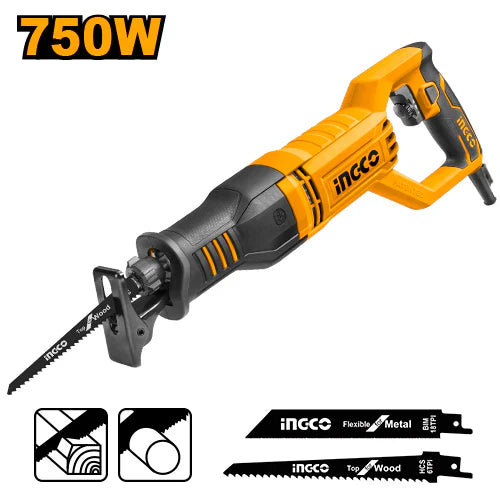Reciprocating Saw
Reciprocating Saw: The Demolition Powerhouse You’ll Want in Your Toolbox

If you’re tearing down walls, slicing through metal pipes, or trimming tree branches, a reciprocating saw—often called a recip saw—is your go-to tool. Known for its aggressive push-and-pull blade motion, this versatile power tool is built for speed, not finesse. Whether you’re a contractor or a weekend DIYer, it’s perfect for demolition, renovation, and rough cuts through wood, metal, and more.Ingco Reciprocating Saw 750W RS8008
What Is a Reciprocating Saw?
A recip saw uses a motor to drive a blade back and forth rapidly, allowing you to cut through tough materials with ease. It’s not about clean lines—it’s about getting the job done fast.
You’ll use it for:
- Cutting through wood, nails, and metal pipes
- Removing old window or door frames
- Slicing drywall, plaster, or PVC
- Trimming tree limbs and branches
Corded vs. Cordless Models
| Type | Pros | Cons |
|---|---|---|
| Corded | Unlimited power, great for long jobs | Tethered to outlet, less mobile |
| Cordless | Portable, ideal for tight spaces | Limited runtime, needs charging |
Corded saws are great for heavy-duty tasks, while cordless models offer freedom of movement for quick cuts and remote work.
Key Features to Look For
When choosing a recip saw, consider:
- Brushless motor: Longer life, better efficiency
- Variable speed trigger: Control your cutting pace
- Stroke length: Longer strokes = faster cuts
- SPM (Strokes Per Minute): Higher SPM means quicker work
- Tool-free blade change: Swap blades easily
- Pivoting shoe: Stabilizes the saw for better control
- Vibration control: Reduces fatigue during long use
Blade Types and Materials
Pick the right blade for the job:
| Blade Type | Best For |
|---|---|
| Wood-cutting | Framing, trim, branches |
| Metal-cutting | Pipes, nails, sheet metal |
| Demolition | Mixed materials, rough cuts |
| Carbide-tipped | Cast iron, masonry |
| Bi-metal | Versatility across wood and metal |
Safety Tips
Recip saws are powerful—use them safely:
- Wear goggles, gloves, and ear protection
- Keep both hands on the tool
- Disconnect power before changing blades
- Avoid loose clothing or jewelry
- Let the blade stop fully before setting it down
- Don’t force the cut—let the saw do the work
Maintenance Tips
Keep your saw running smoothly:
- Clean vents and moving parts after each use
- Remove and store blades properly
- Lubricate parts as recommended
- Inspect cords and batteries for damage
- Store in a dry, dust-free area
Common Uses in Renovation
Recip saws are perfect for:
- Cutting drywall to access plumbing or wiring
- Removing nails, screws, or fasteners
- Trimming wood for window and door replacements
- Slicing through metal pipes or brackets
- Breaking down pallets or old furniture
Accessories That Boost Performance
Upgrade your recip saw with:
- Anti-vibration handles
- Blade organizers
- Adjustable shoe plates
- Universal blade adapters
- LED lights for dark workspaces
Where to Buy in South Africa
If you’re shopping locally, Construction Hyper is a trusted destination for power tools and accessories. Based in Pietermaritzburg, they stock a wide range of tools from leading brands and offer competitive pricing, expert advice, and reliable service. Whether you’re a pro or a DIYer, they’ve got what you need to get started.
FAQs
Can it cut through nails and pipes?
Absolutely—just use a metal-cutting blade.
Is it good for left-handed users?
Most models are ambidextrous with center-mounted triggers.
How heavy is a recip saw?
Typically between 2.5 and 4.5 kg, depending on size and battery.
What’s the lifespan of a recip saw?
With proper care, 5–10 years or more.
Final Thoughts
A recip saw isn’t just a tool—it’s your demolition sidekick. Whether you're slicing through studs or pruning branches, it’s built to cut through chaos with speed and confidence. Choose the right model, match your blade to the job, and let the saw do the heavy lifting. Your next renovation just got a whole lot easier.




